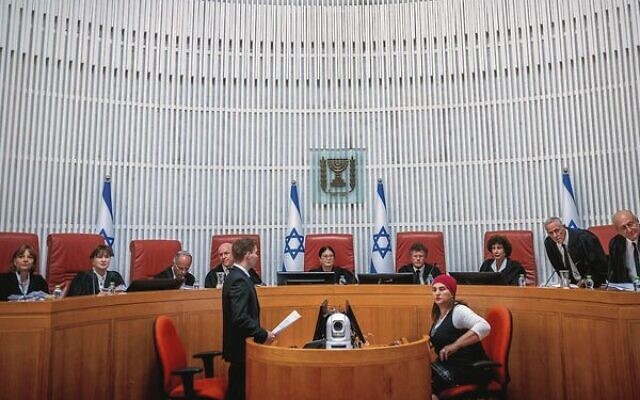Netanyahu dismisses international criticism
Prime Minister Benjamin Netanyahu has dismissed international criticism that his judicial overhaul is undermining democracy and said he will not be swayed by outside pressure.

(Times of Israel) – For the first time ever, the High Court of Justice in Israel will convene a 15-judge panel to hear petitions against the highly controversial law passed last week to limit the court’s oversight of its own actions.
Supreme Court President Esther Hayut issued a statement on Monday saying she had decided that every justice on the court would preside over the hugely significant and explosive hearing against the “reasonableness” law which, together with the rest of the Netanyahu coalition’s judicial overhaul agenda, has created an unprecedented protest movement against the government.
The eight petitions the court has accepted against the law will be heard on September 12.
However, Prime Minister Benjamin Netanyahu again refused to pledge that the government would abide by a potential future High Court decision to strike down the reasonableness law.
“I think we have to follow two rules. One is, Israeli governments abide by the decisions of the Supreme Court. And at the same time, the Supreme Court respects the Basic Laws [such as the law passed last week], which are the closest thing we have to a constitution,” Netanyahu said during an interview with NBC News. “I think we should keep both principles, and I hope we do.”
Netanyahu also dismissed international criticism that his judicial overhaul is undermining democracy and said he will not be swayed by outside pressure.
Speaking to Fox News’s Mark Levin, Netanyahu, in an apparent rebuke to the Biden administration and others, said other countries should not interfere in Israel’s internal issues.
Netanyahu said that in his 16 years in power, “I never commented on the internal debates of other democracies,” adding that “everybody has an opinion on Israel; they don’t have an opinion on the riots in France or the protests there, or the debates that happen in other countries.”
Meanwhile, Opposition Leader Yair Lapid demanded an 18-month freeze on legislation aimed at overhauling the judiciary as a condition for his Yesh Atid party to return to negotiations with the coalition on judicial reforms.
Lapid, speaking from the Knesset rostrum on the last day before summer recess, said that such a freeze must be cemented into law for his party to trust it.
Yesh Atid sources backed up Lapid’s assertion that this demand was in line with the type of guarantee he had asked from Likud last week amid frenzied, and ultimately unsuccessful, attempts to compromise ahead of the coalition passing its first judicial reform law.
Lapid also said he would be prepared to join a coalition with Likud, but not while Netanyahu continues to lead the party.
“Not while Netanyahu is there,” Lapid told the Ynet news site after being asked about the possibility, mooted in recent days both in order to help eject the far-right from the coalition and to support a potential normalisation deal with Saudi Arabia.
“That is because I am a decent man, and that would be the death of decency,” he said.
Defense Minister Yoav Gallant warned at a closed-door meeting of the Knesset’s Foreign Affairs and Defense Committee that national tensions over the government’s overhaul plans could harm Israel’s security, amid heightened tensions on all fronts.
According to a spokesperson for the committee, Gallant said that “there is harm to national resilience that may lead to harm to national security.”
He also warned that the unity of the military had been damaged as protests against the overhaul have roiled the ranks of the Israel Defense Forces. Thousands of reservists have said they will end their volunteer reserve duty in protest of the overhaul.
“There has been harm to cohesion, and there could be future harm,” Gallant was cited as saying, adding that calls by reservists to refuse to show up due to the legislation must be “condemned and denounced.”
The chief of a special police unit and four other officers were summoned for questioning by Justice Ministry investigators over allegations they used excessive force against protesters opposed to the overhaul.
The head of the Tel Aviv police’s Yasam special patrol unit, Chief Superintendent Yair Hanuna, and the other officers allegedly brutalised demonstrators during mass protests that erupted last week. Around 30 demonstrators sought medical treatment after the protest.
The Justice Ministry’s Police Internal Investigations Department (PIID) is conducting the probe into officers’ handling of the protest. Hanuna and the other officers are suspected of beating protesters in three separate incidents in Tel Aviv, Channel 12 reported.
Multiple complaints by protesters have been filed against Hanuna, including that he broke a demonstrator’s nose at a rally about two weeks ago in Tel Aviv.
Meanwhile, officials from the United Arab Emirates have sought to woo Israeli doctors to move to the Gulf country, as some medical professionals discuss moving abroad due to the judicial overhaul.
Thousands of doctors have joined a chat group seeking advice on how to relocate overseas, and some have begun to receive lucrative offers to move to the UAE, Channel 12 reported.
The offers came from official sources in the UAE, as well as Bahrain, which see the turmoil in Israel and the interest in moving abroad as an opportunity, the report said.

comments